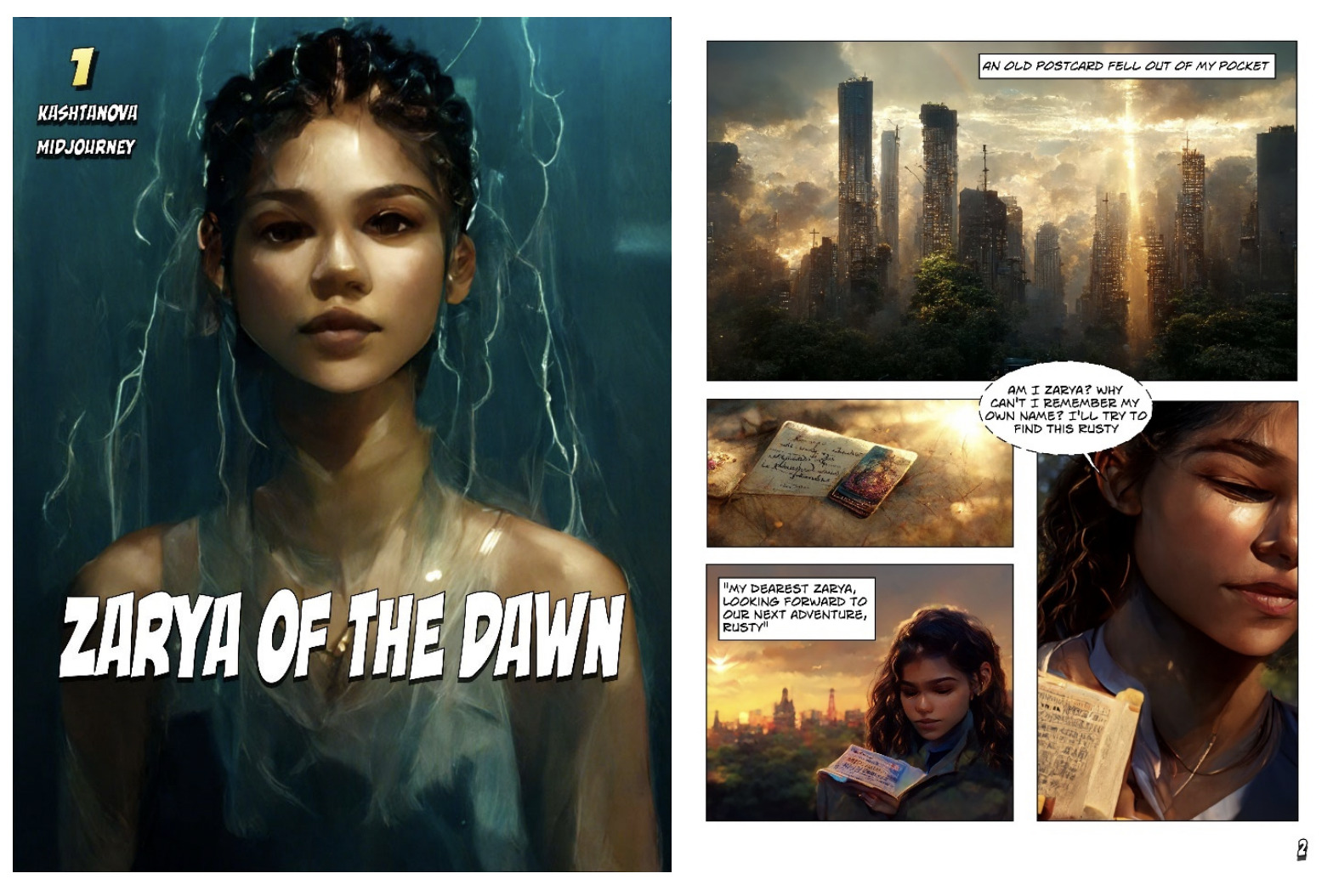“In one sense this is a success, in that the registration is still valid and active. However, it is the most limited a copyright registration can be and it doesn’t resolve the core questions about copyright in AI-assisted works.” – Van Lindberg

Image taken from Copyright Office Letter
The U.S. Copyright Office (USCO) this week finalized its refusal to uphold, in part, a registration it issued to Kristina Kashtanova for a graphic novel that contained generative artwork and human story and design elements.
How We Got Here
On September 15, 2022, the USCO issued a copyright registration to Kashtanova as the claimant for their graphic novel, Zarya of the Dawn. However, in October, Kashtanova received a notice of cancellation from the USCO, along with a request for additional information regarding their creative process behind the work.
Kashtanova officially responded, with the assistance of counsel, to the USCO in November 2022. In that response, Kashtanova argued in support of sufficient human authorship “despite [their] use of Midjourney’s image generation service as part of [their] creative process.”
In a letter sent to Kashtanova’s counsel on Tuesday, the USCO expressed its concerns that underlying artwork generated using the AI-powered text-to-image tool Midjourney was capable of meeting the human authorship requirement for copyright protection.
“Because Midjourney starts with randomly generated noise that evolves into a final image, there is no guarantee that a particular prompt will generate any particular visual output,” the USCO wrote in the letter.
The USCO does acknowledge that the text of the graphic novel “as well as the selection, coordination, and arrangement of the Work’s written and visual elements” are protectable under copyright law. The original certificate issued to Kashtanova will be cancelled, according to the letter, and a new one will be issued, along with an update to the public record, to “briefly explain that the cancelled registration was replaced with the new, more limited registration.”
Reactions
For their part, Kashtanova was encouraged that the USCO did not cancel the registration outright. “This is a great day for everyone that is creating using Midjourney and other tools,” Kashtanova shared in an emailed statement. “When you put your images into a book like Zarya [of the Dawn], the arrangement is copyrightable. The story is copyrightable as well, as long as it’s not purely AI produced. That covers a lot of uses for the people in the AI art community.”
However, Van Lindberg of Taylor English Duma LLP, who represented Kashtanova in the response to the cancellation notice, was less optimistic. “In one sense this is a success, in that the registration is still valid and active,” Lindberg wrote in a public statement. “However, it is the most limited a copyright registration can be and it doesn’t resolve the core questions about copyright in AI-assisted works.”
AI Integration is Testing the Law
As noted previously, problems remain with the ability to adequately detect or otherwise identify generative works. Disclosure regarding the use of AI tools, and the degree to which the finished work was human authored, remains an arguably moral and ethical obligation on creators when claiming copyright over a work prepared with the assistance of AI tools. Additionally, the step of filing an application for registration with the USCO is subject to fines under 17 U.S.C. §506(e) for anyone that “knowingly makes a false representation of a material fact.”
“The [USCO] is developing registration guidance for works created in part using material generated by artificial intelligence technology,” the USCO confirmed in a written statement. “The Office will be hosting public events on artificial intelligence and issuing a notice of inquiry on copyright and AI later this year.”
Tools that generate synthetic materials have the ability to unlock “creative” capabilities at the click of a button. Microsoft, through its partnership with OpenAI, is heavily integrating AI-powered tools into its numerous products and services, from Bing search to the Microsoft 365 productivity suite.
This decision from the USCO also calls into question commercial stock services, such as Adobe Stock’s recently launched AI submission guidance and offerings, that license generative art assets. Based on the USCO’s letter, any such assets that are the output of an AI tool similar to Midjourney are not eligible for copyright protection and would be considered public domain works.
Looking Ahead
The exact next steps for Kashtanova remain unclear. A cancellation action brought by the USCO under 37 CFR § 201.7 only addresses the option of a 30-day response window by a claimant that receives notice under the statute. The statute does not address what happens if a cancellation is finalized, whether in whole or in part. The decision could potentially be appealed under 37 CFR § 202.5(b)(1), but that statute only addresses disputes in a refusal to register that occur before a completed registration is issued by the USCO.
The USCO is in the middle of a separate lawsuit with Dr. Stephen Thaler that addresses a similar issue of how much involvement by a human is required to claim ownership over the output of an AI system, or, as Thaler argues, that there should be no human authorship requirement.

![[IPWatchdog Logo]](https://ipwatchdog.com/wp-content/themes/IPWatchdog%20-%202023/assets/images/temp/logo-small@2x.png)

![[Advertisement]](https://ipwatchdog.com/wp-content/uploads/2024/04/Artificial-Intelligence-2024-REPLAY-sidebar-700x500-corrected.jpg)
![[Advertisement]](https://ipwatchdog.com/wp-content/uploads/2024/04/Patent-Litigation-Masters-2024-sidebar-700x500-1.jpg)

![[Advertisement]](https://ipwatchdog.com/wp-content/uploads/2021/12/WEBINAR-336-x-280-px.png)
![[Advertisement]](https://ipwatchdog.com/wp-content/uploads/2021/12/2021-Patent-Practice-on-Demand-recorded-Feb-2021-336-x-280.jpg)
![[Advertisement]](https://ipwatchdog.com/wp-content/uploads/2021/12/Ad-4-The-Invent-Patent-System™.png)






Join the Discussion
No comments yet.